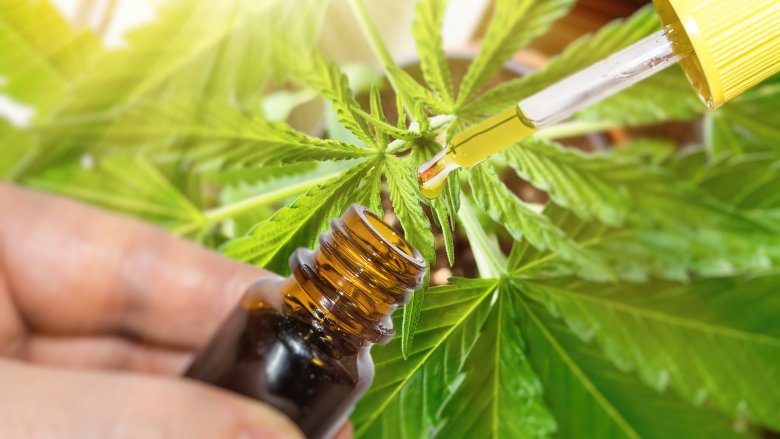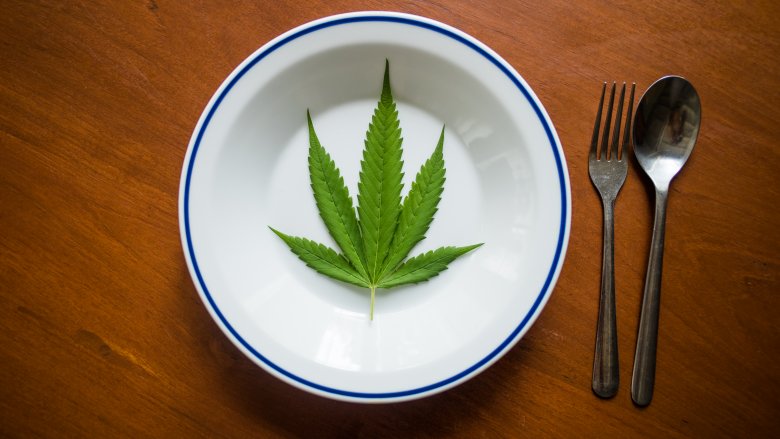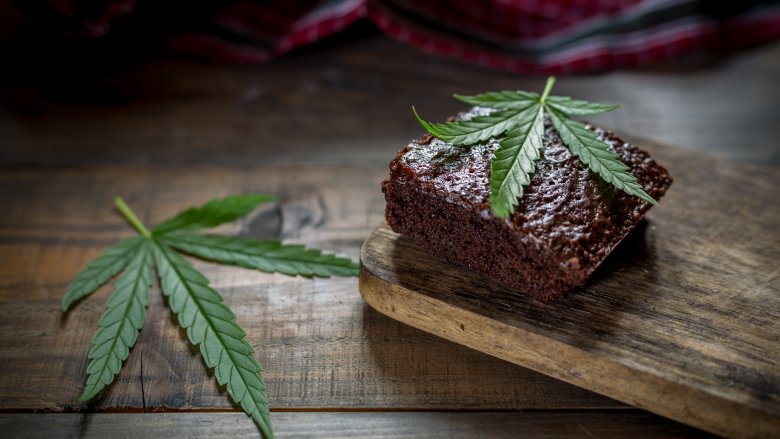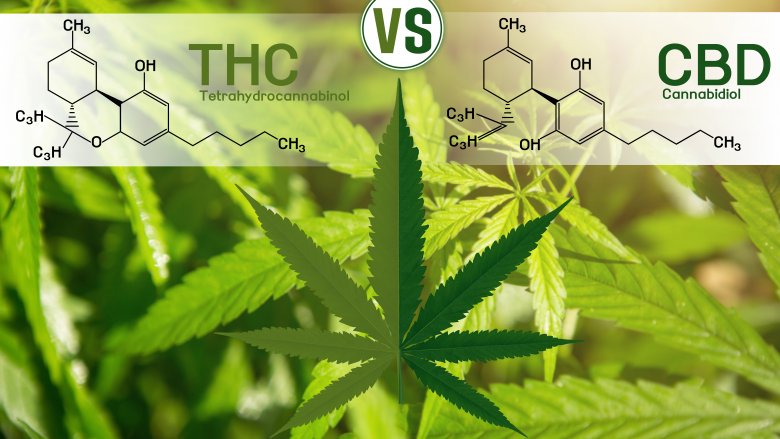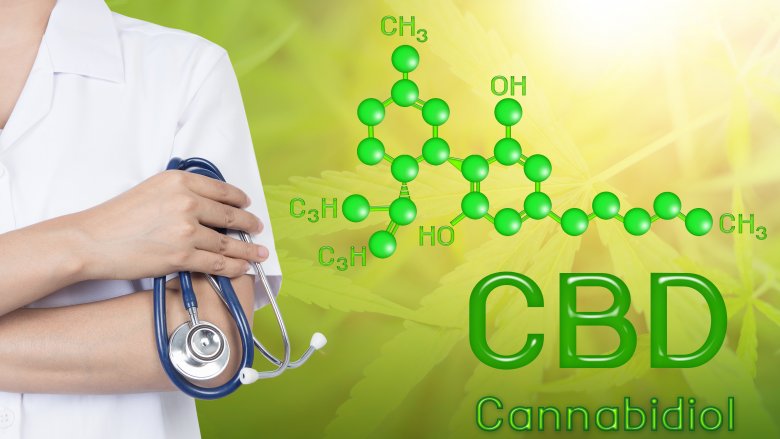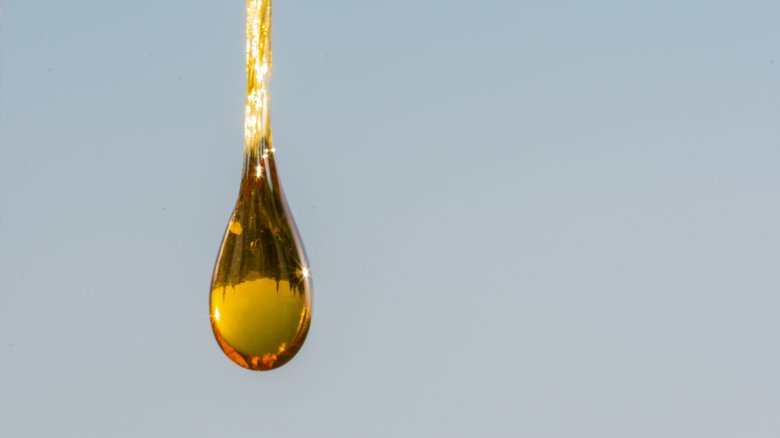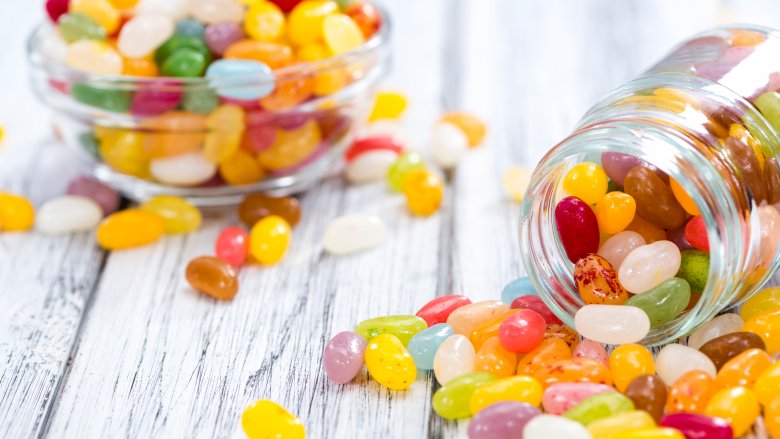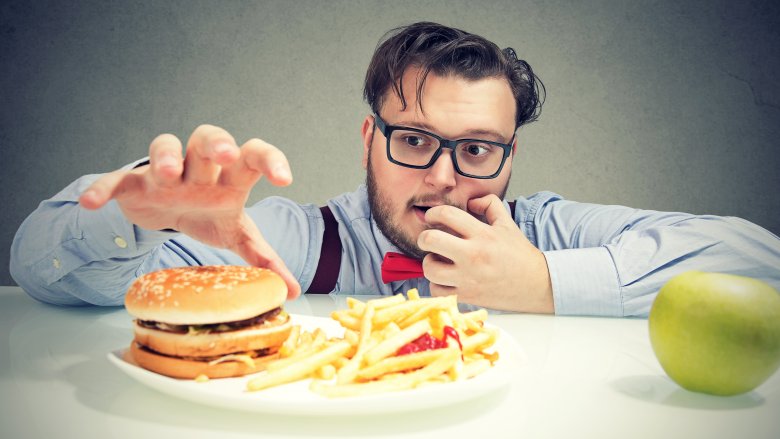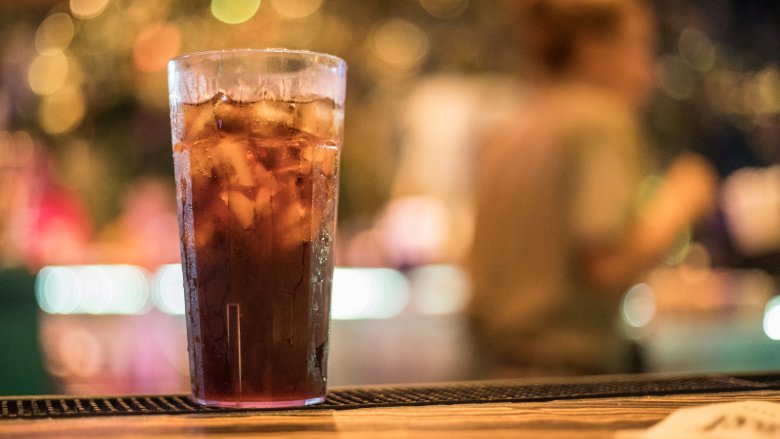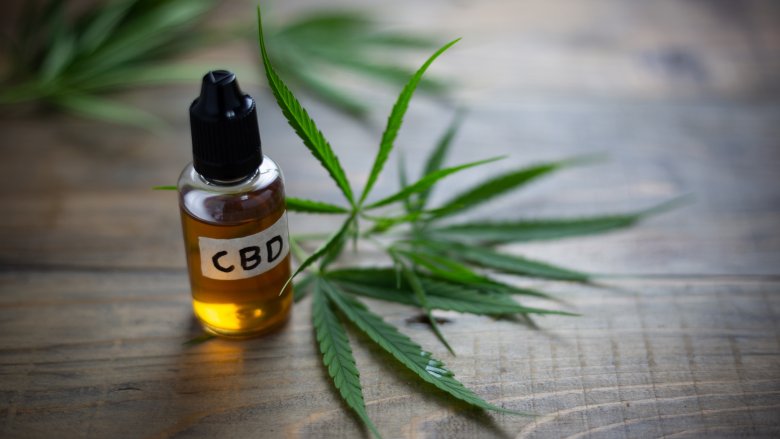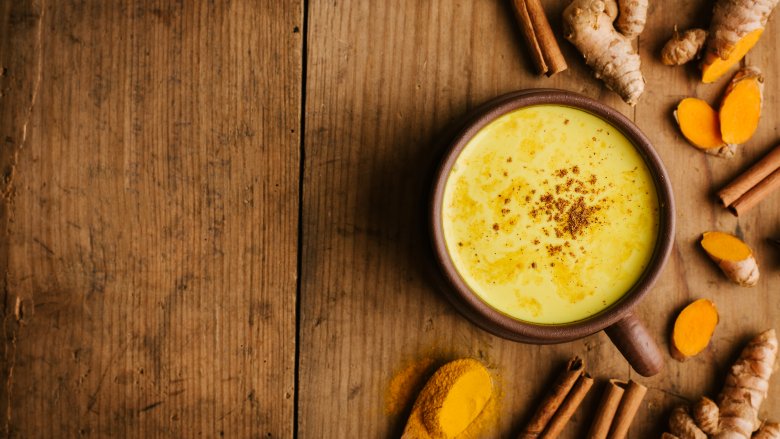The Untold Truth Of CBD-Infused Foods
According to the Drug Policy Alliance, 2019 polls suggest that around half the American public is in favor of making marijuana legal. Only a handful of states originally took the leap into regulating it instead of criminalizing it, and while it seems likely that more and more will follow, something else happened in the wake of legalizing marijuana: the emergence of cannabis-infused foods.
But it's far from simple, and for anyone who's not in the know, it would be easy to think that the trend means people are getting high off the same kind of pot brownies that tend to pop up at college parties. Others might think it's a completely harmless food additive that just makes you feel a little bit better, and honestly, who couldn't use a little bit of feel-better-juice?
There's a third belief here, too, and that's the idea that these foods are a miraculous cure-all for everything from depression to arthritis. What's the truth? It's actually pretty complicated, so let's take a look at what it is, what it isn't, and what you need to know before you try any of the ultra-trendy CBD-infused goodies that are on the market today.
Professionals see it kicking off a major food trend
CBD-infused foods are set up to be a huge deal. According to the National Restaurant Association's annual poll (via USA Today) asking more than 650 professional chefs what foods trends they see on the horizon, a whopping 77 percent said CBD-infused drinks and foods were their prediction for 2019's top food trends.
Some of the products that already have their foot in the door and have been met with quite a bit of excitement are foods like CBD-infused milkshakes, glazed donuts (with candied hemp on top), fruity and flowery drinks, olive oil, candy, coffee, and cereal. If the chefs' predictions are true, though, that's just the start of what you're going to see popping up on menus all over.
But here's the thing: Food trends come and go. Will CBD-infused foods be here to stay, or will they go the same way as freakshakes and those trendy, black, charcoal-infused ice cream cones? Only time will tell, but according to predictions from marijuana research firm Greenwave Advisors, the CBD section of the industry could very easily hit $3 billion a year just by 2021, and they also see the potential for it to hit numbers up to $200 billion a year.
Legalities vary widely
As of 2019, The Washington Post says federal laws indicate anyone who's adding CBD oil into their foods is in violation of the Federal Food, Drug, and Cosmetic Act of 1938. The law basically says it's illegal to add an active ingredient into products that are going to cross state lines, and it's essentially put in place to keep companies from introducing drugs into the food chain. As of April 2019, the FDA was still in the data-gathering stage, but some individual states had already passed legislation that contradicted those federal laws.
In Colorado, for example, a law passed in 2018 made it perfectly legal to add any and all parts of the hemp plant to food. Then there's states like Ohio, which decided that while no one's allowed to just go selling CBD oil and CBD-infused foods anytime, anywhere, they do allow it to be prescribed and taken under a doctor's supervision. Go to California or Maine, and they have laws that are more in line with the FDA's stance on the whole thing.
And some places take it very seriously. In February 2019, The Atlantic reported New York City's health department was cracking down — hard — on restaurants that were caught adding CBD to foods, because it hadn't yet been approved by the FDA as a safe food additive. Anyone busted would be stopped and fined.
What, exactly, is CBD?
Let's take a minute to clear up a common misconception: CBD isn't the same as marijuana.
CBD is actually short for cannabidiol, and LiveScience notes it's just one of the thousands of compounds found in cannabis plants. It's another compound — THC — that causes the psychoactive effects associated with marijuana, and CBD alone won't cause the same sort of high. Because it's not psychoactive, the extract alone isn't covered by the Drug Enforcement Agency's Controlled Substances Act... as long as it doesn't contain any THC, and we'll talk more about that in a minute.
According to Harvard Health, CBD is a component of medical marijuana, but it comes directly from the hemp plant, not the marijuana plant. The World Health Organization has found no proof that it causes addiction, dependence, or public health problems, and that sounds great, right? Sure, but researchers also warn that since it's largely derived from a substance that has been classified as a Schedule 1 drug, there hasn't been a whole lot of research done on it. And that's the problem.
What are the health benefits?
First, the good news. CBD oil has been found to be an effective treatment for two different types of epilepsy, and it's been approved by the FDA for use in the form of a drug called Epidiolex (via The Mayo Clinic).
According to Healthline, there are numerous studies that have shown CBD oil can be an effective treatment for a number of conditions, including arthritis, multiple sclerosis, inflammation, and sciatic nerve pain. It's also been found to help reduce depression, insomnia, and anxiety, alleviate the pain, symptoms, and side effects of cancer and cancer treatments, and may even have neuroprotective properties. What does that mean? There's a chance it can help treat the symptoms of various neurological disorders, including Parkinson's and Alzheimer's.
There's also a chance it can help treat high blood pressure and repair some of the damage done by heart disease, and there's still more studies that suggest CBD also has antipsychotic and anti-tumor effects, is a preventative against diabetes, and can be used to alleviate some of the symptoms of substance abuse (although those latter studies have, for the most part, not been conducted in humans).
What are the side effects?
It's no secret that some foods can have some less-than-desirable side effects. (We're looking at you and the gastrointestinal havoc you caused on so many unsuspecting consumers, olestra.) So, will anything happen when you order a CBD-infused coffee or chug a CBD milkshake?
Possibly, says Healthline. Studies on CBD noted some side effects were fairly common, and included diarrhea, fatigue, and changes in appetite. According to Sara Ward, a pharmacologist from Temple University (via LiveScience), part of the problem in regulating CBD and cannabis oil is that when it's consumed in food, it can impact people completely differently, stay in the system for an unpredictable amount of time, and the amount of time it takes before it starts working can vary from person to person, too. And that's odd because, she adds, when it's smoked, it has a more predictable and uniform effect.
Many of the mechanisms of CBD oil and just how it interacts with different parts of the body for different people is still under-studied and not well understood, so being aware of potential side effects is key before you're out and about and decide to give it a try.
Here's what you should ask before you snack
Dr. Igor Grant is the director of the Center for Medicinal Cannabis Research at the University of California, San Diego, and he says (via Huffington Post) that because there's still so much that's unknown and unregulated about CBD oil, you shouldn't just assume that because it's being served in a restaurant or packaged and sold in an oil form that you know what you're getting.
"From a physician standpoint, I see cannabinoid as another possible medicine... But the question is, would you put any medication — say aspirin — into Pepsi? To me, that's crossing a line because people don't know what they're taking."
Even Christine Smith, the founder of Grön CBD (which sells CBD-infused chocolate and skin products) says that it's super important that people don't just consume it blindly. She stresses how important it is to research a purveyor of CBD-infused foods, ask to see certificates of analysis, test results, and product liability insurance before you buy and eat. Why? Because irresponsibly sourced and incorrectly prepared CBD oils can contain high levels of lead, pesticides, and even THC. According to Allan Frankel, a doctor at the Greenbridge Medical Services (via Vice), hemp products from Slovenia and China are known to contain all kinds of heavy metal contaminants, and it's something you need to watch out for.
You wouldn't eat strawberries that came from questionable sources, would you? CBD oil is no different.
Yes, it's possible it could cause you to fail a drug test
While CBD oil, THC, and marijuana are not the same things, Forbes says it's important that people know it's entirely possible that snacking on CBD-infused foods could make you fail a drug test — and there's no way to tell if you're in the small percentage of people who will fail until it happens.
They shared the case of one woman who was prescribed CBD oil by her doctor. It was meant to treat her anxiety, and in spite of the fact that she had never smoked marijuana in her life, she failed a drug test and lost out on the opportunity to get a new job.
Why? Because CBD products are notoriously inconsistent, and since there are no controls yet in place through the FDA, it's entirely possible that CBD oil you pick up and put in your afternoon smoothie does, in fact, contain trace amounts of THC. The Centers for Disease Control and Prevention have published reports on their findings that there are fake CBD oils out there, and you don't always know what you're getting.
There's also the chance that if you consume high levels of CBD oil — about 1,000 milligrams per day — it can also trigger a positive result on a drug test. And since people metabolize CBD in different ways, it's impossible to tell whether or not it's going to show up for you. The more you know!
Those jelly beans could interact with other medications
There's a lot that's pretty rough about today's world, but you can open a package of cookies or candy and pop a few in your mouth, secure in the knowledge there's nothing in there that can hurt you... right?
That's the problem with CBD-infused foods: That's not the truth, especially if you're currently taking certain kinds of prescription medication.
According to The Huffington Post, medical researchers have found a huge problem with CBD oil. Around 60 percent of prescription medications rely on a specific group of liver enzymes to work. These are the same enzymes that break down CBD, and basically, combining CBD with these medications can magnify the effects.
And that can be a huge problem. CBD can react with blood thinners, and someone taking both could develop a hemorrhage. CBD and some prescription anxiety drugs can interact to have a sedative effect, and sometimes, they can even become toxic or interfere with respiratory processes. Not all of the potential interactions are known, but there are studies that suggest antibiotics, NSAIDs (like Advil), antihistamines, beta blockers, and antidepressants can all potentially interact — severely — with CBD oil. The more CBD in your bloodstream, the more likely an interaction is.
In short: If you're on other medications, consult your doctor before trying those CBD-infused jelly beans.
Will it make you overeat?
Even those who haven't tried puffing away on a joint know that marijuana can cause the munchies. With the rise in popularity of CBD-infused foods, that's caused dietitian Cara Rosenbloom to wonder (via The Washington Post) if eating these foods is likely to encourage people to overeat and ultimately put on weight because of it.
Like many things associated with CBD, it's complicated.
The experts she consulted agreed that it's the THC in marijuana that's responsible for causing those who partake to have the overwhelming urge to finish off not just the whole pizza, but a bag of Doritos and a cheeseburger as well. But there's a "but."
Since CBD has been found to relieve things like pain and nausea, it's possible that it can act as an appetite booster for some people. You're more likely to eat more if you're not nauseous, after all, and that can make it a valuable additive for people going through things like cancer treatments. Not only might it make them feel better, but it also might help them keep weight on. It hasn't been associated with weight gain in users who fall into the "normal" or "overweight" categories, so it's entirely possible this is one more in the win category for CBD.
Coca-Cola CBD?
Everyone knows by now that Coca-Cola actually used to have cocaine in it, and that just goes to show how much things have changed in just a few short decades. But in 2018, rumors started circulating that Coca-Cola might be getting back on the horse, so to speak. According to Forbes, word on the street was that they had started talking to Aurora Cannabis about the potential of partnering up to create a CBD-infused drink.
It wasn't long before Coca-Cola CEO James Quincey responded to the rumors, saying (via Business Insider) that they had "no interest in marijuana or cannabis." They had no plans for such a beverage, but they were keeping an eye on just what was happening in the industry.
But the rumor mill got grinding again in early 2019, when Medium picked up a press release reporting that two former Coca-Cola executives, Tim Haas (former CEO of Coca-Cola Foods) and Eugenio Mendez (former Coke VP of global marketing for enhanced drinks) joined Charlotte's Web, a Colorado-based company making CBD-infused products. Is there a link? Time will tell.
There's a huge problem with mislabeling
It's no secret that you can buy anything online, and if you're hoping to order some CBD oil to make your own goodies at home, you should know that it might be a case of "buyer beware."
In 2017, the University of Pennsylvania School of Medicine published their findings (via Science Daily) that as many as 70 percent of CBD oil extracts available online weren't what they claimed. Since there were no regulations in place when it comes to labeling, there was no standardization when it came to defining what's in that bottle you're ordering and making sure claims were accurate.
The research team found that of the 84 products they sampled, 42 percent contained a higher concentration of CBD oil than they claimed. Another 26 percent were wrong the other way, containing way less CBD than their labels indicated. And there's a problem both ways. Too much CBD can actually lessen its effectiveness, while not enough means you're not getting anywhere near the benefits you expect.
They also confirmed that some of the products did still contain THC — and that meant parents who were ordering their child's epilepsy treatments online could very easily be giving them something they absolutely didn't intend. And that makes it extra important to know you're buying from a reputable source.
You definitely don't need to go to a restaurant
So, CBD-infused food is 2019's hot new restaurant trend, but thanks to the growing popularity of the additive, you absolutely don't need to track down a gourmet coffee shop if you want to try it. There are some incredibly easy-to-make CBD-infused foods and drinks you can whip up right in your own kitchen, should you decide it's something you're up for trying.
Have you heard of golden milk? It's incredibly easy to make, and it's been lauded for inflammation-reducing properties and its ability to boost sleepy-time chemicals in the brain, and according to Boston Magazine, that all makes it the perfect vehicle for some pre-bedtime CBD. Just simmer 2 cups milk (almond or coconut), 1 teaspoon of coconut oil, 1 teaspoon of turmeric, 1/2 teaspoon of cinnamon, 1 teaspoon of honey, 1 teaspoon of vanilla extract, and a dash each of ginger, black pepper, clove, and nutmeg together for about 10 minutes. Pour it into a mug, add your CBD oil (starting with a small dose at first), and that's it.
CBD oil gummies are also incredibly easy to make: All you need is fruit juice, gelatin, and honey. Mix in CBD oil or powder, heat, and pour into molds. Let them chill, and there you go!
